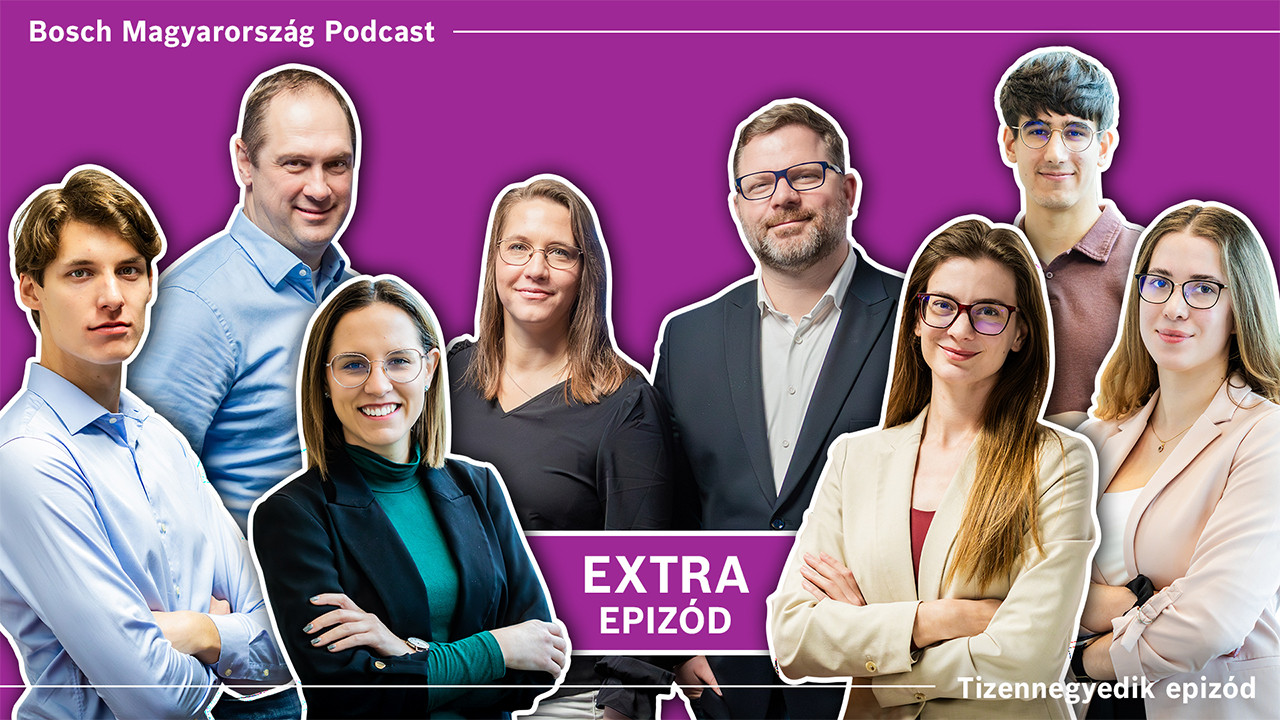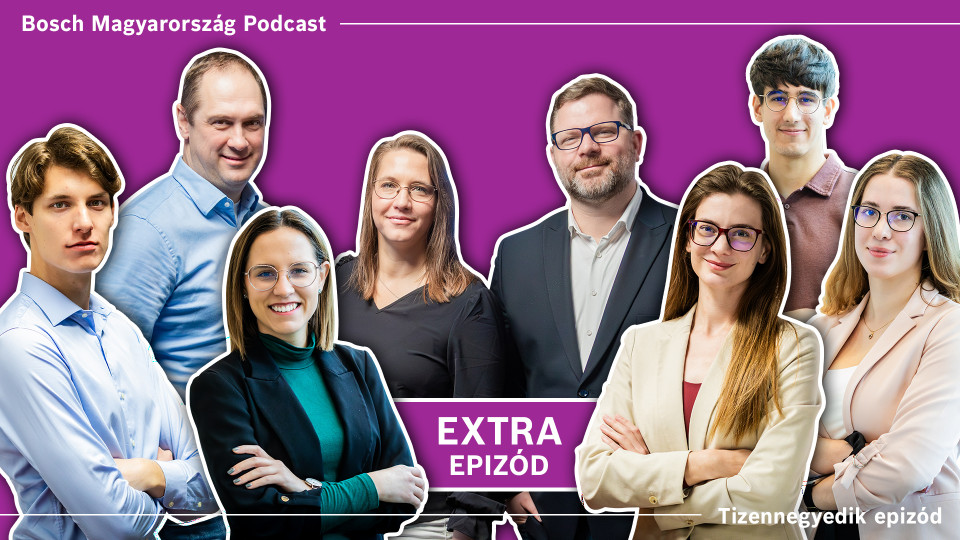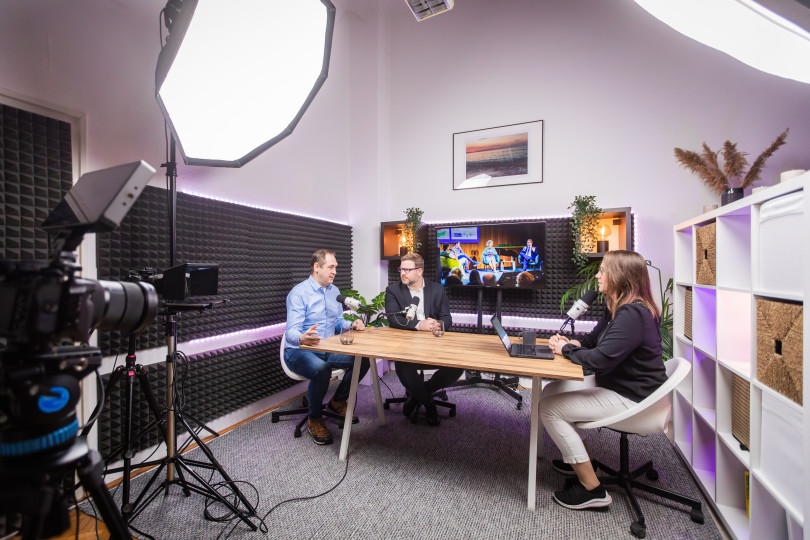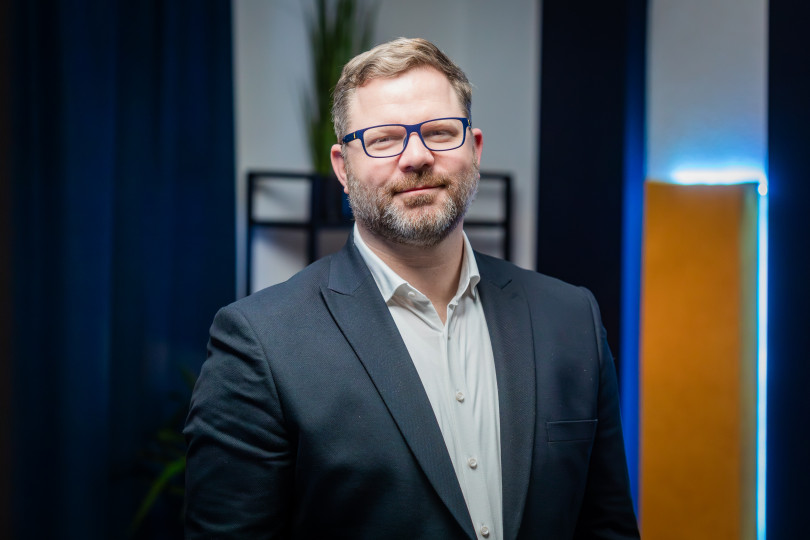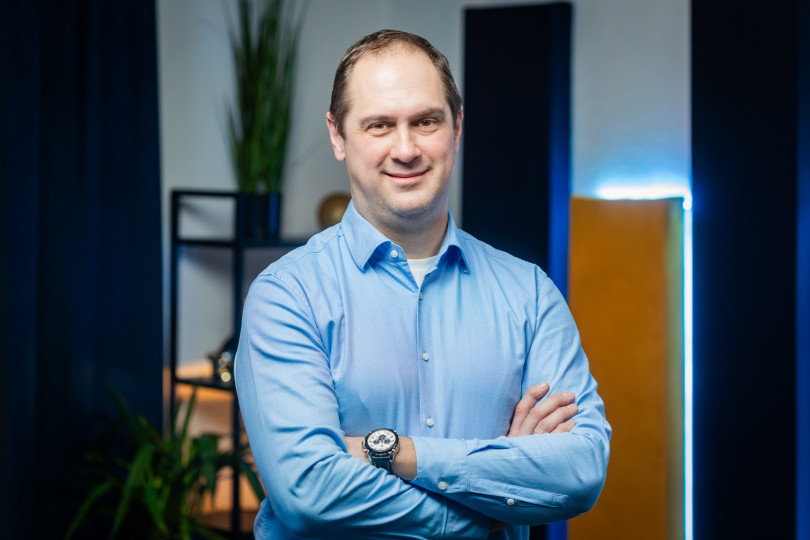Generational differences, especially in the world of work, can lead to awkward situations, tensions and discord, many say. Is this necessary? Can innovation pressures cause conflict or strengthen cooperation between generations? Should we treat age differences as a problem or an opportunity? The expert guests Krisztián Steigervald and András Somogyi, the latest guests on the Bosch Hungary Podcast, seek answers to similarly pressing questions that need to be answered.
Budapest – Innovation is not only a synonym for technological progress, but also a phenomenon that is drastically transforming the lives of all of us, regardless of age. The generational causes and consequences of this change are discussed by the guests of the special episode of the Bosch Hungary Podcast, generations researcher Krisztián Steigervald and András Somogyi, vice president of human resources of the Bosch Group in Hungary and the Adriatic region. The program also features Bosch Generation Z engineers and experts from Bosch. The program is hosted by Zita Hella Varga, PR manager for corporate communications of the Bosch Group in Hungary.
We live in a rapid world, generations under pressure to innovate
Not so long ago – just a few decades ago – a degree was a knowledge in itself that would clearly define your career path for the 20-30 years after graduation. The world has since accelerated to an extreme, and what you have learned has to be updated, renewed or even rebuilt from scratch almost the next day.
“Everywhere there is a growing need, almost a compulsion, to innovate at an ever-accelerating pace. We quickly get used to any given innovation, and even faster we get bored with it, and if we don’t get something new, we feel a sense of lack,” says Krisztián Steigervald, a generations researcher. Everyone wants to keep up with the increased pace – companies, consumers, workers and managers alike.
Doping or a challenge?
It is not surprising that young people adapt most easily and enthusiastically to fast-paced change, while other age groups are more cautious, selective and do not necessarily see anything new as something better. Members of Gen Z are already born into this ever-accelerating world. They are the ones for whom change is no longer a challenge to be solved, but an inspiration and something akin to doping. They are the ones who do not accept conventions and rules imposed by authority, but question them, looking for convincing arguments, explanations and credible answers.
Workplaces with five generations on the horizon
According to Krisztián Steigervald, not only is the pace of change more dizzying than before, but the age composition of companies is also becoming broader, especially as the retirement age continues to increase. „In the past, fewer generations working together contributed to predictability, but today we are talking about workplaces with four, and slowly five, generations,” he says, looking ahead. It’s no wonder that companies are keenly interested in the changes that young people bring along, how they are different, how they impact the organization and how they relate to other generations.
One Generation Z speaker in the podcast gives a practical example. “I much prefer to write an email or a message because I find it much easier to get a problem sorted out quickly. Other generations prefer to phone, to arrange a meeting. Of course, it’s more personal and we can touch more points, but it takes a lot more time and maybe that can create frustration between us.”
Generation Z thinks differently, requires different communication, has a different style and is receptive to different ideas. As a human resources manager, András Somogyi sees this as both a challenge and a motivation for companies, forcing both management and all associates to self-reflect and change organizationally, which can benefit not only Generation Z but all generations.
The emphasis is on reciprocity, but what can companies do?
“We have moved away from the previous authority-based family model and the like-minded management model to mutuality at home and at work. Successful companies today should strive for transparent leadership and partnership with colleagues,” says Krisztián Steigervald.
András Somogyi believes that personal openness and individual responsibility of colleagues are also important in cooperation, but he also emphasizes the role of companies. He believes that it is impossible to manage today’s generational relationships with a corporate management approach from 10-15 years ago. “At Bosch, we don’t just think in terms of product innovation, we strive for innovation and improvement in all areas. We promote intergenerational cooperation and mutual understanding through a variety of effective solutions.” These include targeted training, platforms for exchange and feedback, age-diverse mixed teams, and even the conscious design of physical environments and spaces. These all support multi-faceted interconnectivity within the company.
Only together can we succeed
On the topic of intergenerational balance, Krisztián Steigervald reminds Bosch podcast listeners that flexibility to adapt to Generation Z needs is very important, but not everything. In his opinion, one of the most important challenges for companies in the future will be to avoid the luxury of believing in and focusing only on Generation Z, while not giving enough support to the development of colleagues over 40-45. The expert says that you need to be able to address the different needs, learning styles and psychological needs of different generations at the same time.
Generation Z opinions in the podcast also stress the importance of cooperation and mutual learning between the generations: “What we can show the older generation is openness. They, in turn, have such a deep professional knowledge and experience that a mix of the two might be the right way forward. We tend to propose quick, immediate solutions; they are better at seeing the long-term consequences of decisions. Our world is moving into the digital, online space, personal relationships are very important in their lives, and we younger people should embrace that.”
Bosch’s András Somogyi believes that the generation gap can be bridged with the joint will and openness of the company and its employees. Intergenerational cooperation can be strengthened through the company’s values and culture.
Bosch Hungary Podcast: technology in plain language
The Bosch Hungary Podcast deals with the most current issues in innovation and R&D, seeks to provide clear answers to the most pressing questions about the technology of the future with the help of expert guests. If you want to learn more about the connection between multi-generational workplaces and innovation, you can listen to the answers and even watch them on Bosch Hungary’s podcast channels on YouTube, Spotify, Apple Podcasts, and Simplecast!
Zita Hella Varga
Phone: +36 70 667-6374
Bosch has been present in Hungary since 1898 with its products. After its re-establishment as a regional trading company in 1991, Bosch has grown into one of Hungary’s largest foreign industrial employers with currently eight subsidiaries. In fiscal 2023 it had total net sales of 2.207 billion forints and consolidated sales to third parties on the Hungarian market of 343 billion forints. The Bosch Group in Hungary employs more than 18,300 associates (as of December 31, 2023). In addition to its manufacturing, commercial and development business, Bosch has a network of sales and service operations that covers the entire country.
The Bosch Group is a leading global supplier of technology and services. It employs roughly 417,900 associates worldwide (as of December 31, 2024). According to preliminary figures, the company generated sales of 90.5 billion euros in 2024. Its operations are divided into four business sectors: Mobility, Industrial Technology, Consumer Goods, and Energy and Building Technology. With its business activities, the company aims to use technology to help shape universal trends such as automation, electrification, digitalization, connectivity, and an orientation to sustainability. In this context, Bosch’s broad diversification across regions and industries strengthens its innovativeness and robustness. Bosch uses its proven expertise in sensor technology, software, and services to offer customers cross-domain solutions from a single source. It also applies its expertise in connectivity and artificial intelligence in order to develop and manufacture user-friendly, sustainable products. With technology that is “Invented for life,” Bosch wants to help improve quality of life and conserve natural resources. The Bosch Group comprises Robert Bosch GmbH and its roughly 470 subsidiary and regional companies in over 60 countries. Including sales and service partners, Bosch’s global manufacturing, engineering, and sales network covers nearly every country in the world. Bosch’s innovative strength is key to the company’s further development. At 136 locations across the globe, Bosch employs some 86,900 associates in research and development, of which nearly 48,000 are software engineers.
The company was set up in Stuttgart in 1886 by Robert Bosch (1861–1942) as “Workshop for Precision Mechanics and Electrical Engineering.” The special ownership structure of Robert Bosch GmbH guarantees the entrepreneurial freedom of the Bosch Group, making it possible for the company to plan over the long term and to undertake significant upfront investments in the safeguarding of its future. Ninety-four percent of the share capital of Robert Bosch GmbH is held by Robert Bosch Stiftung GmbH, a charitable foundation. The remaining shares are held by Robert Bosch GmbH and by a corporation owned by the Bosch family. The majority of voting rights are held by Robert Bosch Industrietreuhand KG. It is entrusted with the task of safeguarding the company’s long-term existence and in particular its financial independence – in line with the mission handed down in the will of the company’s founder, Robert Bosch.
Additional information is available online at www.bosch.hu, iot.boschblog.hu, www.bosch.com, www.iot.bosch.com, www.bosch-press.com, www.twitter.com/BoschPresse

